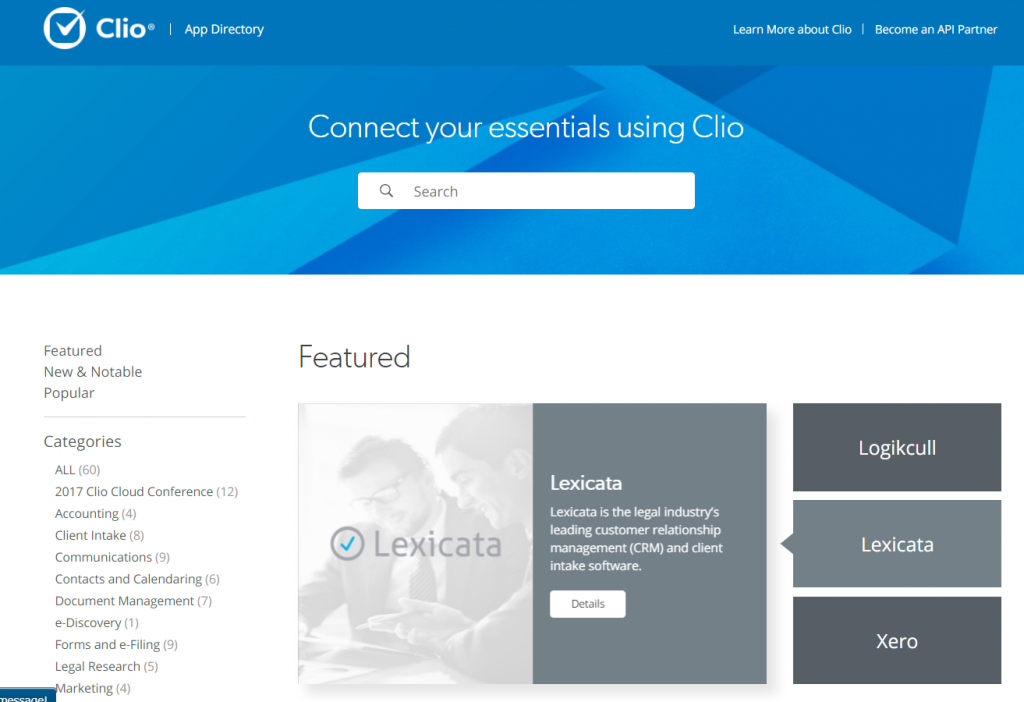I wrote recently about major announcements made by Clio at its annual Clio Cloud Conference, including a major reengineering of its platform and a new direction for the company, from “law practice management” in the cloud to “law practice” in the cloud. Key to that new direction is Clio’s ever-growing number of integration partners that extend its platform’s capabilities.
Now, Clio has announced the addition of 12 more integration partners, bringing the total to more than 70. Almost all of the apps that integrate with Clio can be found in Clio’s new App Directory. (The director lists 60, but a Clio spokesperson tells me there are others that have not yet been added to the directory.)
The new additions are:
Borderwise Pro. Borderwise Pro is form preparation software for immigration lawyers. Prepare complete immigration applications, including all required forms and addenda, by answering simple and straightforward questions. The integration allows users to share their contacts across Clio and Borderwise to eliminate redundant data entry.
Digitory Legal. Create accurate budgets and detailed project plans, using customizable litigation templates with task-level detail and optional activity code tracking. Follow actual-to-budget tracking in Clio and sync budget matter and budget numbers, as well as automated task creation and tracking to Clio.
Legably. Legably connects vetted attorneys with those on the Legably network who need short-term help for projects and client needs. The integration allows Legably users to more efficiently manage the work that they receive over the Legably platform. (See my review.)
Legalinc. Automate a client’s corporate compliance and entity management functions. The integration allows users to reduce double entry and errors, while ensuring information is up to date across both platforms. From there, each imported entity can be separately subscribed to a suite of services such as registered agent service, compliance notifications, foreign qualifications, or EIN acquisition, among others.
Lexop. Select a contact from Clio and serve legal documents via email, track in real-time the status of their delivery, all while managing a compliance. Collect documents from clients and colleagues easily and securely and sync them with Clio matters instantly.
Logikcull. Logikcull is cloud-based e-discovery software that gives enterprises, law firms and governments control of the discovery process.
PieSync. PieSync integrates Clio with other popular apps for an automatic two-way contact sync. Every time a contact is added or updated in Clio, it is automatically synced with the other app, and vice versa, eliminating the need to import and export.
Tali. Tali allows legal professionals to track time using Amazon Alexa. By integrating with Clio, Tali automatically records and syncs activities, matters, and clients. (See my review.)
TrustBooks. Users can manage trust accounting and stay compliant with their state bar using this integration. Sync all Matters from Clio directly into TrustBooks, saving time by entering information once in Clio, and syncing it with TrustBooks. (See my review.)
Vijilent Data-Portraits Webapp. A Vijilent integration allows users to export searchable PDF Data-Portraits back into Clio matter documents and electronically archive social media so it is court admissible. Vijilent Case links and Data-Portrait links are automatically placed in Clio matters and contacts, adding another layer to Clio contact information.
YoCierge. Receive a call from an existing client or contact registered in Clio and YoCierge’s phone system will search a user’s Clio data based on the caller’s number. If the system finds a match, it will show the contact name, matter name, description, and the attorney handling it.
Zipwhip. Zipwhip for Clio allows users to seamlessly record text message conversations (SMS and MMS) in Clio as a single source of record to get a complete overview of interactions and compliance requirements. (See my review.)
 Robert Ambrogi Blog
Robert Ambrogi Blog